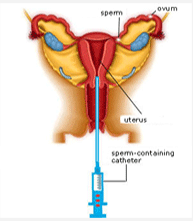IUI is a fertility treatment that uses a catheter to place a number of washed sperm directly into the uterus. The goal of IUI is to increase the number of sperm that reach the fallopian tubes and subsequently increase the chance of fertilization.

When is IUI used?
IUI is a fertility treatment often selected by couples who have been trying to conceive for at least one year but who have no known reasons for their infertility. It may also be selected as a fertility treatment with any of the following conditions:
• Low sperm count
• Decreased sperm mobility
• Requirement of donor sperm
• A hostile cervical condition, such as cervical mucus that is too thick
• Sexual dysfunction
Although IUI still requires the sperm to reach and fertilize the egg on its own, it is important to make sure that the sperm is healthy and mobile. IUI provides the sperm an advantage by giving it a head start, but it still has to seek out the egg on its own.
The IUI procedure is simple and may be performed even if the woman is not receiving medication to improve her egg production. Many physicians will encourage women to take medications to stimulate the ovaries in order to increase egg production and, hopefully, the chance of achieving pregnancy.
An ultrasound will be used to monitor the size of the follicles (follicles develop into eggs). The hormone, human Chorionic Gonadotropin (hCG), is administered to stimulate the release of eggs from the follicles within 34-40 hours.
A semen sample will be processed by the lab in order to separate the semen from the seminal fluid. A catheter is used to inject the processed sperm directly into the uterus. This process maximizes the number of sperm cells that are placed in the uterus and thus increases the possibility of conception. The IUI procedure is short and involves minimal discomfort. The next step is to watch for signs and symptoms of pregnancy.
Younger women usually have higher rates of success compared to women over age 35, but the average success rate for IUI ranges from 10-20% in one cycle. With IUI, as with other methods of artificial insemination, the success is dependent on the health of the sperm and the woman's body.